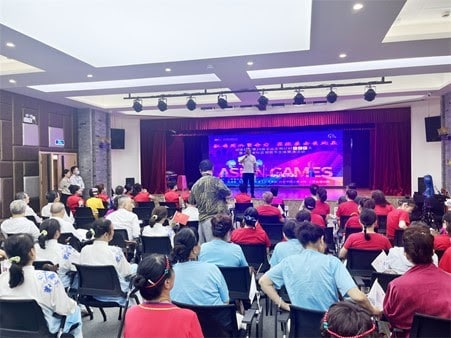(Zhejiang province) An official church held a celebration event marking the countdown of 100 days to the Asian Games. However, all the content of the event had no relation to Christianity. Pastor Chen Fengsheng, an evangelical pastor of the church, also submitted his resignation recently.
Official church
Sicheng Church is an officially registered church in Hangzhou, Zhejiang province. In recent years, it has been increasingly aligning itself with the official political agenda of the Chinese Communist Party (CCP). On June 16th, Sicheng Church decided to celebrate the countdown of the 19th Asian Games held in Hangzhou.
Secular event
Members organized a series of cultural athletic performance activities, and the church orchestra performed non-Christian songs. The event’s program included a skit, tai chi, a dance performance, Yue opera, a qipao show, roliball, and partner dances. Each portion of the event showcased traditional Chinese art forms and music.
Sicheng Church released an official statement on the event: “As a church located in the Xiaoying Alley community of Hangzhou, we are honored to be able to contribute to the upcoming Asian Games.”
Sicheng Church background
Sicheng Church is one of the oldest remaining Christian churches in Hangzhou, with a history of nearly a century. It originated from the Northern American Presbytery and was established by American missionaries Mr. and Mrs. Nevius in 1859. In 1868, it was set up as a preaching venue in a rented house on Pishi Lane by Chinese pastor Zhang Chengzhai. Four years later, the church purchased a three-room hall in Fengle Bridge to serve as a chapel. With an increasing number of believers, a new church building was constructed on the site of the old Fengle Bridge Church in 1924 and completed in 1927.
During the Cultural Revolution, Sicheng Church was converted into a warehouse for the Hangzhou Library. With the implementation of religious policies in 1981, the church property was returned, and Sicheng Church reopened. On August 30 of the same year, a ceremony was held to commemorate the reopening of the church.
Political pressure
Under CCP pressure, the official church became an eager vanguard of Sinicization. Last year, they organized a special session to implement the spirit of the 19th National Congress with lead pastor Huang Mingke. Sicheng Church was also honored at a national conference organized by the United Front Work Department on December 29, 2022.
“China’s Christianity”
Pastor Huang Mingke emphasized the church’s relevance in Sinicization: “Sicheng Church, as a demonstration site on a provincial level for the popularization of law, a provincial-level publicity and education base for religion governed by law, a demonstration site for the Sinicization of Christianity, and a safe religious site, should actively and continuously promote the Sinicization of Christianity and strive to do a good job of adapting Christianity to a socialist society so that Christianity can truly become China’s Christianity.”
So-called compatibility
The proposition of Christianity being “compatible” with socialism was first introduced by the authorities as a cunning proposition. If the regime is relatively tolerant of Christianity, Christianity’s existence and distinctness can be relatively preserved. However, if the regime’s power fully intrudes into Christianity, then Christianity has to conform to the political demands of the regime. There is no process of mutual adaptation between the two. Only Christianity has to adapt to socialism; there is no socialism adapting to Christianity. If the church accepts this false proposition of “compatibility” advocated by the authorities, the outcome would be the sacrifice of Christianity’s uniqueness and its transformation to conform to socialism. This is the unfair political situation that registered Christianity in China faces today.
Evangelical pastors
This is a test of faith for evangelical pastors in the church who want to safeguard the remaining baseline of their faith, and if they stay in the church, it is difficult for them as individuals to resist, in addition to cooperating with the regime.
Resignation
Chen Fengsheng is perhaps one such pastor. He served Sicheng Church for seven years but officially resigned on July 1. The pastor did not give a reason for his resignation. However, many believed his resignation was related to the narrow space for his faith and constant political pressure.
Sinicization and religious freedom
An anonymous senior pastor from an unregistered family church revealed that under President Xi Jinping, the “Sinicization of religion” severely restricts religious freedom. Registered Three-Self churches are particularly targeted and have no way to escape. The Asian Games event was just a small example of the comprehensive patriotic association forced upon registered churches in China.
~Gao Zhensai, Special Correspondent of ChinaAid

